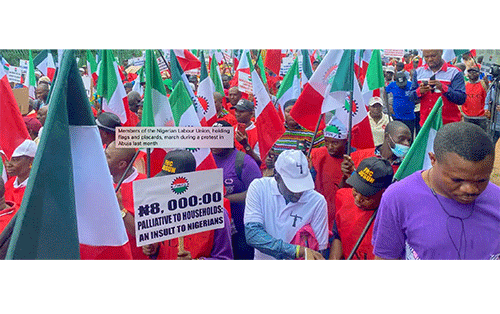ABUJA – Nigerian unions began an indefinite strike yesterday, closing schools and public offices.
The strike impacted airports and shut down the national power grid after talks with the government failed to agree a new minimum wage. The worst cost-of-living crisis in a generation in Africa’s most populous country has left many Nigerians struggling to afford food.
The main Nigeria Labour Congress (NLC) and the Trade Union Congress (TUC) urged workers to down tools after the government refused to increase its minimum wage offer beyond
60 000 naira (US$45) per month, according to local media.
“Nigeria workers stay at home. Yes! To a living wage. No! To a starvation wage!” the unions said in a joint statement.
Since coming to office a year ago, president Bola Ahmed Tinubu has ended a fuel subsidy and currency controls, leading to a tripling of petrol prices and a spike in living costs, as the naira has slid against the dollar.
Tinubu has called for patience to allow the reforms to take effect, saying they will help attract foreign investment, but the measures have hit Nigerians hard.
Government buildings, petrol stations and courts in the capital Abuja were closed, AFP journalists saw, while the doors to the city’s airport were also shut, and long queues formed outside.
A source close to the Federal Airports Authority of Nigeria (FAAN) said domestic flights had been cancelled, and the airport would be shut to all flights on today.
AFP has contacted FAAN for comment.
The unions are also protesting an electricity tariff hike.
The labour union at the Transmission Company of Nigeria said it had shut down the national grid overnight.
Blackouts were reported across the country.
Security was stepped up, with an increased presence of soldiers on the streets of Abuja.
Outside the Federal Secretariat, which houses several ministries, picketing union members urged workers to return home.
“Stay at home, and stay safe. We don’t want to embarrass you. No work now,” they called.
In Lagos, an AFP journalist saw the industrial court was padlocked shut, and children walked back home after finding their schools were closed.
In the northern city of Kano, government offices were shut, and public schools closed.
Children in one neighbourhood chanted: “No school; it’s a free day!”
The unions said in a statement on Friday: “Nigerian workers, who are the backbone of our nation’s economy, deserve fair and decent wages that reflect the current economic realities”.
AFP has contacted the government for comment.
Thousands of Nigerians rallied against soaring living costs in February, though previous strikes have had limited effect.
– Nampa/AFP


